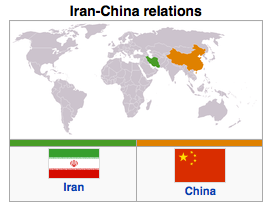Iran Oil Embargo: China’s Options – Analysis
By IPCS
By Teshu Singh
The West is tightening its efforts to impose an oil embargo on Iran. China is facing a dilemma over the present situation in Iran as its energy demands are enormous. China is Iran largest trading partner and it has invested heavily in Iranian oil fields. In 2011, Beijing and Tehran signed a deal that gave China exclusive rights to several Iranian oil and natural gas field till 2024. China’s Sinopec had signed a deal in 2007 to develop the huge Yadavaran oil field which the US tried to prevent. About forty per cent of China’s crude oil from Saudi Arabia, Iran and Oman are dependent on the Straits of Hormuz for the purposes of routing their energy exports. Interestingly, when the embargo was announced, the state-owned National Iranian Oil Company said that it “will replace European customers.” The suggestion may have been that the replacement could be China. In the light of this, will China join the embargo along with the US and EU against Iran from 1 July 2012?

China has voiced opposition to any further sanctions as well as the ban on the import of Iranian oil by the US and the EU. Iran has also warned that if the embargo is imposed it will block the Straits of Hormuz which is the only sea route for oil and gas exports from the Persian Gulf to other regions.
The success of the embargo will largely depend on China’s future actions. People’s Daily has stated that “Getting involved in sanctions against Iran would greatly undermine China’s economic, strategic and other interests.” China, for the last thirty years, has practiced what it describes as an independent foreign policy of peace, a hallmark of which is the principle of non-interference in the sovereign affairs of other nations. Having been the target of US sanctions, China believes that the proposed embargo lacks international legitimacy. It is therefore highly unlikely that China will join the embargo – the present state of affairs is therefore conducive to Chinese strategic interests.
Any development in the Straits of Hormuz will seriously affect China’s energy needs. As an alternative, China has begun to explore other foreign oil sources to ensure smooth supply and reduce its dependence on Iran. China is likely to maintain its present relations with Iran while at the same time trying to explore more sources of energy.
China’s roaring appetite for stable supply of oil and gas is pushing it towards the Gulf. China is pushing for the strategic Abu Dhabi Crude Oil Pipeline (ADCOP) also known as Habshan-Fujairah oil pipeline in the UAE. The 404 kilometre pipeline would connect Abu Dhabi’s Habshan oilfield to Fujairah port. Once it is operational it will be able to transport 1.5 million barrels of oil a day initially, and further expand to 2 million barrels a day. This particular pipeline will help China to ease any risks that would arise from the disruption of the Hormuz Strait. Once operational, the pipeline will lower dependency on oil terminals in the Gulf, increase export potential on the UAE’s eastern seaboard, and reduce shipping traffic in the Hormuz Strait. China has also entered a new phase of friendly cooperation with the UAE. This development can be seen as an effort by China to maintain a steady flow of oil.
Saudi Arabia has already been supplying an extra 200,000 barrels per day to China since November 2011. China is also seen as an ideal match for the Saudis, as China’s demand for oil is expected to grow in the near future.
These alternatives will give Beijing an advantage in renegotiating the price of Iranian crude oil since Iran’s international isolation will significantly weaken Iran’s negotiating position. China’s state-backed oil trading companies are likely to be the main beneficiaries of the Western embargo on Iranian oil exports. These companies would try to purchase Iranian oil at a cheaper rate at this moment and build-up its own oil reserves, especially when China wishes to expand its twenty day oil stocks to a hundred day strategic reserve.
China has taken a balanced stand on the Iran issue until now. Although it recognizes Iranian enrichment as long as it adheres to the guidelines of the IAEA, it has voted against Iran on its nuclear weapons programme. However, if China does not join the embargo, it will be seen as going against the US and EU. Today, with the US as China’s second largest export market after EU, China-US relations are as important as China-Iran relations. As a permanent member of UNSC, China is obliged to support global sanctions along with other major powers, and the present situation will undoubtedly test Chinese mettle as a responsible international power.
Teshu Singh
Research Officer, IPCS
email: [email protected]

“As a permanent member of UNSC, China is obliged to support global sanctions along with other major powers, and the present situation will undoubtedly test Chinese mettle as a responsible international power.”
What does this mean? No submission to the U.S. = not responsible?